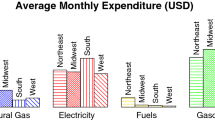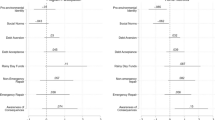Abstract
The consumption of natural resources is rapidly emerging as a major social problem, and social efforts to control this consumption are guided in part by research that tries to specify the meaning of resources to consumers. This paper compares a sociological perspective with the more widespread economic model of consumption, using data from study of billing systems, sociocultural status, and household energy use in a California apartment complex. The research suggests that the role of marginal price in ordering consumption can be interpreted as a contingent feature of the socially structured relationship between consumption and social status. It also suggests that the utility of a technology is a secondary and emergent product of its use, a fact obscured by the conventional analytic separation of supply and demand or means and ends.
Similar content being viewed by others
References
Arrow, Kenneth 1987 “Rationality of self and others in an economic system.” In Robin Hogarth and Melvin Reder (eds.), Rational Choice. Chicago: The University of Chicago Press.
Buttel, Frederick, H. 1979 “Social welfare and energy intensity: A comparative analysis of the developed market economies.” In C. Unseld, D. Morrison, D. Sills, and C. Wolf (eds.), Sociopolitical Efficient Energy Use Policy. Washington, DC: National Academy of Science.
Cross, John 1983 A Theory of Adaptive Economic Behavior. Cambridge: Cambridge University Press.
Deutscher, Isaac 1973 What We Say/What We Do: Sentiments and Acts. Glenview, IL: Scott, Foresman.
Dewey, John 1929 Experience and Nature. New York: Random House.
Douglas, Mary andBrian Isherwood 1979 The World of Goods. New York: W. W. Norton and Co.
Ewen, Stuart 1976 Captains of Consciousness: Advertising and the Social Roots of the Consumer Culture. New York: McGraw-Hill.
Friedman, Debra andMichael Hechter 1988 “The contribution of rational choice theory to macrosocial research.” Sociological Theory 6:201–218.
Granovetter, Marc 1985 “Economic actions and social structure: A problem of embeddedness.” American Journal of Sociology 91:481–510.
Hackett, Bruce 1987 “Energy consumption and energy billing in apartments.” In Willett Kempton and Max Neiman (eds.), Energy Efficiency: Perspectives on Individual Behavior. Washington, DC, and Berkeley, CA: American Council for an Energy Efficient Economy.
Hardin, Garrett 1968 “The tragedy of the commons.” Science 162:1243.
Herschleifer, Jack 1985 “The expanding domain of economics.” American Economic Review 75:53–68.
Kempton, Willett andLaura Montgomery 1982 “Folk quantification of energy.” Energy 7:817–827.
Marshall, T. H. 1964 “A note on ‘status.’” In Class, Citizenship and Social Development. New York: Doubleday.
Mazur, Alan andEugene Rosa 1974 “Energy and lifestyle: Cross-national comparison of energy consumption and quality of life indicators.” Science 186:607–10.
McCloskey, Donald 1985 The Rhetoric of Economics. Madison: The University of Wisconsin Press.
Nader, Laura andS. Beckerman 1978 “Energy as it relates to the quality and style of life.” Annual Review of Energy 3:1–28.
Nelson, Samuel 1981 “Energy savings attributable to switching from master to individual metering of energy.” Argonne, IL: Argonne National Laboratory.
Parsons, Talcott andNeil Smelser 1956 Economy and Society. Glencoe, IL: The Free Press.
Rosa, Eugene, Kenneth Keating, andClifford Staples 1981 “Energy, economic growth and quality of life: A cross-national trend analysis.” Proceedings International Congress of Applied Systems Research and Cybernetics: 258–264. New York: Pergamon.
Rosa, Eugene, Gary Machlis, andKenneth Keating 1988 “Energy and society.” Annual Review of Sociology 14:149–172.
Schipper, Lee, Andrea Ketoff, andAdam Kahane 1985 “Explaining residential energy use by international bottom-up comparisons.” Annual Review of Energy 10:341–405.
Schipper, Lee andAllan Lichtenberg 1976 “Efficient energy use and well-being: The Swedish example.” Science 194:1001–1013.
Schnaiberg, Allen 1980 The Environment: From Surplus to Scarcity. New York: Oxford University Press.
Simon, Herbert 1982 Models of Bounded Rationality. Cambridge, MA: MIT Press.
Socolow, Robert 1978 Saving Energy in the Home: Princeton's Experiments at Twin Rivers. Cambridge: Ballinger.
Stern, Paul 1986 “Blind spots in policy analysis.” Journal of Policy Analysis and Management 5:200–227.
Stern, Paul andElliott Aronson 1984 Energy Use: The Human Dimension. New York: W. H. Freeman and Co.
Veblen, Thorstein 1979 The Theory of the Leisure Class. (1899*) New York: Penguin.
Vine, Edward, Paul Craig, James Cramer, Thomas Dietz, Bruce Hackett, Dan Kowalczyk, andMark Levine 1982 “The applicability of energy models to occupied houses: Summer electricity use in Davis.” Energy 7:909–925.
Author information
Authors and Affiliations
Rights and permissions
About this article
Cite this article
Hackett, B., Lutzenhiser, L. Social structures and economic conduct: Interpreting variations in household energy consumption. Sociol Forum 6, 449–470 (1991). https://doi.org/10.1007/BF01114472
Issue Date:
DOI: https://doi.org/10.1007/BF01114472




